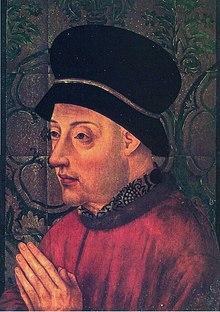John I (Portugal)
Johann I. KG ( Dom João I ; born April 11, 1357 in Lisbon ; † August 14, 1433 in Lisbon) was the tenth king of Portugal and the first from the house of Avis . He ruled from 1385 to 1433.
Life
Johann I was the son of Peter I and his lover Teresa Lourenço. Before his accession to the throne, he was called "Johann von Avis".
Already at the age of six he was appointed Grand Master of the Order of Avis in 1363 , because as an illegitimate child he could not claim the throne, but was provided for "economically".
In 1367 Peter I died . His son Ferdinand I succeeded him . He died in 1383 without a male heir. The direct male line of the house of the Burgundian rulers in Portugal was thus extinguished. Via Ferdinand's heir, Beatrix , who was married to King John I of Castile , Portugal would have fallen to the Castilian crown by way of succession .
First, Ferdinand's widow Leonore Teles de Menezes briefly took power together with her lover. However, she was extremely unpopular among the people, also because of her pro-Castilian stance. A majority of the Portuguese distrusted the Castilian promise of autonomy and were against the unification of the country with Castile. With the revolution of 1383 Leonore was overthrown after only six weeks of rule. Johann von Avis placed himself at the head of the rebels, killed Leonores' lover himself and forced them into exile in Castile. When the Castilian John then marched into Portugal with a large army, John of Avis was appointed by the Cortes as "Defender of the Fatherland".
In 1385 the decisive battle of Aljubarrota took place , in which the Portuguese, led by John von Avis and his general, Nuno Álvares Pereira , who was later canonized, faced a numerically stronger and better equipped Castilian army. With the help of the allied English , John of Avis succeeded in defeating Castile. With this, Castilian attempts to incorporate Portugal were permanently repulsed and Portugal's independence saved. The assembly of estates ( Cortes ) proclaimed Johann von Avis the new king of the country. In memory of the decisive battle that he won, Johann donated the Santa Maria da Vitória monastery in Batalha .
Succession
Johann became the progenitor of two Portuguese royal dynasties. He was the founder of the House of Avis, which ruled Portugal until 1580. The House of Braganza , which ruled Portugal from 1640 to 1853, can be traced back to his illegitimate son Alfons , the first Duke of Braganza . The age of discovery began for Portugal with his son Heinrich the Navigator .
reception
In historiography, Johann I is considered to be a clever and power-conscious ruler, who, however, was personally sociable and, thanks to his spiritual upbringing, extremely educated.
The German writer Reinhold Schneider paints a vivid picture of the epoch of John I in his novel Die Silberberne Ampel (Cologne-Olten 1956), which primarily deals with the life of Nuno Álvares Pereira .
family
In order to secure the alliance with England , Johann married Philippa of Lancaster in 1387 , a daughter of John of Gaunt, 1st Duke of Lancaster and thus the granddaughter of King Edward III. from England. He had the following children with her:
- Branca (July 13, 1388; † 1389)
- Alfons (* July 30, 1390; † November 22, 1400)
- Edward I (born October 31, 1391 - † September 9, 1438)
- Peter of Portugal (December 9, 1392 - May 20, 1449), Duke of Coimbra and Regent of Portugal
- Henry the Navigator (March 4, 1394 - November 13, 1460)
- Elisabeth (Isabel) (born February 21, 1397 - † December 17, 1471), she married Duke Philip III in 1430 . , the good guys, from Burgundy and was the mother of Charles the Bold ( House of Burgundy )
- Branca
- John of Portugal (born January 13, 1400 - † October 18, 1442)
- Ferdinand von Avis (born September 29, 1402 - † June 5, 1443)
He was also the father of the following illegitimate children:
- (with Inês Pires) Alfons of Braganza , 1st Duke of Braganza and progenitor of the House of Braganza (* 1377; † 1461),
- (with Inês Pires) Beatriz (* around 1386 - 23 October 1439), married to Thomas Fitzalan, 12th Earl of Arundel ( House FitzAlan ), and John Holland, 2nd Duke of Exeter ( House Holland )
- Branca (* 1378; † 1379)
See also
- History of Portugal
- Timeline Portugal
- Portugal under the Burgundian rulers
- Portugal under the house of Avis
literature
- Peter Feige: Johann I 'the Great' . In: Lexicon of the Middle Ages (LexMA). Volume 5, Artemis & Winkler, Munich / Zurich 1991, ISBN 3-7608-8905-0 , Sp. 502-504.
| predecessor | Office | successor |
|---|---|---|
| Ferdinand I. |
King of Portugal 1385–1433 |
Edward I. |
| personal data | |
|---|---|
| SURNAME | Johann I. |
| ALTERNATIVE NAMES | Avis, Johann von |
| BRIEF DESCRIPTION | King of Portugal |
| DATE OF BIRTH | April 11, 1357 |
| PLACE OF BIRTH | Lisbon |
| DATE OF DEATH | August 14, 1433 |
| Place of death | Lisbon |

